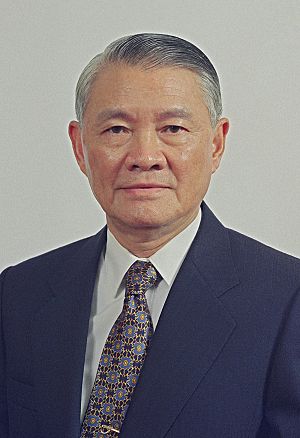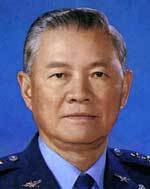Tang Fei facts for kids
Quick facts for kids
Tang Fei
|
|
|---|---|
|
唐飛
|
|

Official portrait, 2000
|
|
| Senior Advisor to the President | |
| In office 6 October 2000 – 20 May 2005 |
|
| President | Chen Shui-bian |
| 13th Premier of Taiwan | |
| In office 20 May 2000 – 6 October 2000 |
|
| President | Chen Shui-bian |
| Vice Premier | Yu Shyi-kun Chang Chun-hsiung |
| Preceded by | Vincent Siew |
| Succeeded by | Chang Chun-hsiung |
| 21st Minister of National Defense | |
| In office 1 February 1999 – 19 May 2000 |
|
| Premier | Hsiao Wan-chang |
| Vice Minister | Wu Shih-wen |
| Preceded by | Chiang Chung-ling |
| Succeeded by | Wu Shih-wen |
| 16th Chief of the General Staff of the ROC Armed Forces | |
| In office 5 March 1998 – 31 January 1999 |
|
| President | Lee Teng-hui |
| Preceded by | Lo Ben-li |
| Succeeded by | Tang Yao-ming |
| 16th Executive Vice Chief of the General Staff of the ROC Armed Forces | |
| In office 1 July 1995 – 4 March 1998 |
|
| President | Lee Teng-hui |
| Preceded by | Lo Ben-li |
| Succeeded by |
|
| 12th Commander-in-Chief of the ROC Air Forces | |
| In office 1 September 1992 – 30 June 1995 |
|
| President | Lee Teng-hui |
| Preceded by | Lin Wen-li |
| Succeeded by | Huang Hsien-jung |
| Personal details | |
| Born | 15 March 1932 (age 93) Taicang, Jiangsu, Republic of China |
| Political party | Independent (2000–present) |
| Other political affiliations |
Kuomintang (1952–2000) |
| Spouse | Chang Ming-tsan |
| Education | Republic of China Air Force Academy (BS) |
| Military service | |
| Allegiance | |
| Branch/service | |
| Years of service | 1944–1999 |
| Rank | Senior General |
| Battles/wars | Third Taiwan Strait Crisis |
Tang Fei (Chinese: 唐飛; pinyin: Táng Fēi; born on March 15, 1932) is a Taiwanese politician and a retired general from the ROC Air Force. He served as the prime minister of Taiwan from May to October 2000. He worked under President Chen Shui-bian. Even though he was a member of the Kuomintang (KMT) party, he became prime minister for a party he didn't belong to. He resigned after five months because he disagreed with the new government's plans.
Contents
Early Life and Military Training
Tang Fei was born on March 15, 1932, in Taicang, Jiangsu, which was part of the Republic of China at the time. He started his military journey at a young age. When he was 12, he joined the Chinese Air Force Preparatory School.
Education and Advanced Studies
After finishing preparatory school in 1950, he continued his studies. He graduated from the Republic of China Air Force Academy in 1952. He also completed several advanced military courses. These included the Air Force Squadron Officers' Course in 1963. He also attended the Air Force Command and General Staff College in 1971. Later, he studied at the War College in 1979. These studies helped him become a skilled military leader.
Military Career Highlights
Tang Fei had a long and successful career in the military. He held many different roles. He started as a pilot, flying planes from 1953 to 1960. After that, he became an operations officer from 1960 to 1961. He then served as a flight leader from 1961 to 1965. From 1968 to 1970, he was a squadron commander.
Overseas Assignments
Tang Fei also worked in other countries. His first overseas job was in Washington, D.C., USA. He worked at the ROC embassy as an assistant air attaché from 1972 to 1975. Later, from 1979 to 1982, he was posted to South Africa. There, he served as an armed forces attaché at the ROC embassy.
Leadership Roles in Taiwan
When he returned to Taiwan, he continued to take on important roles. He was a wing commander from 1983 to 1984. He also served as the Air Force deputy chief of staff for planning from 1984 to 1985. In 1985, he became the superintendent of the Chinese Air Force Academy. From 1986 to 1989, he was the director of the Air Force's Department of Political Warfare.
In 1989, he became the commanding general of the Combat Air Command. He then served as vice commander-in-chief of the ROC Air Force from 1989 to 1991. From 1991 to 1992, he was the director of the Department of Inspection for the Ministry of National Defense. He then became the commander-in-chief of the ROC Air Force from 1992 to 1995. From 1995 to 1998, he was the executive vice chief of the general staff.
Transition to Civilian Leadership
In 1998, Tang Fei was promoted to a four-star general. He became the chief of the general staff. This was a very important military position. He was the first military officer to answer questions from lawmakers in the Legislative Yuan. In 1999, he retired from the military. He then took on a civilian role as the minister of national defense.
Key Contributions as Minister
As Minister of National Defense, Tang Fei worked on important projects. He helped modernize military equipment and personnel. He also played a big part in creating new laws. These laws were the National Defense Law and the Organization Law of the Ministry of National Defense. These laws changed how the military was organized. They gave the Ministry of National Defense more power over the military's main headquarters.
Becoming Premier
On March 29, 2000, the newly elected President Chen Shui-bian announced his choice for premier. He chose Tang Fei to lead the new government. Tang Fei served as premier from May 2000 until his resignation on October 3, 2000. He held the position for about four and a half months.
 | Audre Lorde |
 | John Berry Meachum |
 | Ferdinand Lee Barnett |


